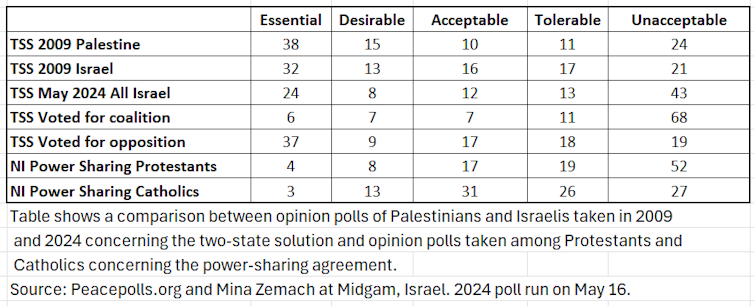By Colin John Irwin, University of Liverpool | –
With the announcement by Norway and Ireland that they have recognised Palestine as an independent state, and Spain expected to follow suit by the end of May, it appears that international momentum for a two-state solution to the Israeli-Palestinian conflict is growing.
The concept has long been supported by the US and its allies, as well as most Arab states and the United Nations. In 2017, Hamas amended its charter to accept the existence of Israel based on borders established after the six-day war in 1967. It reportedly indicated recently a willingness to disarm if a Palestinian state were established. But the present Israeli government led by the prime minister, Benjamin Netanyahu remains implacably opposed to a two-state solution.
Could things be different under different leadership? To answer this, we need to know whether the Israeli and Palestinian people could be persuaded to accept such a plan. Here it’s worth taking a look at what polling tells us.
Politicians all too often find it convenient to blame the public for their failures. This is particularly true of failed peacemaking. The Palestinian Center for Policy and Survey Research (PCPSR) has tracked the ups and downs of support for the two-state solution from a high of 51% and 53% for Palestinians and Israeli Jews in polls taken in 2016 to a low of 33% and 34% respectively in 2022.
But pollsters in both Israel and Palestine, who do excellent work to the highest technical standards, sadly have had little or no opportunity to measure public opinion in support of a successful peace process. They measure the situation as it is – in the context of failure. Instead they need to measure what could be, how attitudes could change given proactive political leadership determined to get to peace. With such leadership the numbers change significantly.
Most recently, on the Palestinian side the Institute for Social and Economic Progress asked the two-state solution question in March 2024 in the context of “serious negotiations” and got a 72.5% positive response. This contrasted with PCPSR results a few months earlier in December 2023 which registered support for the two-state solution at only 34% among Palestinians when framed without the context of serious negotiations. Clearly “serious negotiations” are the key.
On the Israeli side, a poll run for the Geneva Initiative in January 2024 got a result of 51.3% support for the two-state solution. Specifically, this was framed in the context of a “return of the hostages agreement, to establish in the future a non-militarised Palestinian state in the West Bank and Gaza, and total normalisation between Israel and Saudi Arabia”. This was only two percentage points below the high point of support at 53% recorded by the PCPSR in 2016.
Security has always been the top priority for Israelis and when that is factored in, success in negotiations can be assured. And significantly demilitarising a future Palestine is not a deal-breaker for the Palestinians, according to the Institute for Social and Economic Progress March 2024 poll.
A PCPSR poll completed for the Palestine Peace Initiative also in March 2024 found that 50.4% of respondents said the two-state solution would be acceptable to Palestinians providing they also get security and an independent state free from occupation.
The solution then to the implementation of the two-state solution appears to be to combine all the elements that can make it a success.
Additionally the scale that is used is also important. In real negotiations it is important to know where the “red lines” are and what the people can be persuaded to accept given positive political leadership.
Al Jazeera English Video: “Ireland, Spain and Norway say they will recognise Palestine as a state”

In Northern Ireland, where public opinion polls were used to detail every element of a peace agreement, the people were asked what was: “essential” (a red line), what was “desirable” or “acceptable”, what was “tolerable” (not wanted but with political leadership could be made into a “yes”), and what was “unacceptable” under any circumstances (another red line).
When we used this scale to gauge support for a two-state solution in 2009, only 21% of Israelis and 24% of Palestinians considered it “unacceptable”. This compares very favourably with equivalent results for views of power sharing in Northern Ireland in polls I conducted in January 1998 that found it was “unacceptable” for 52% of Protestants and 27% of Catholics. Despite this, with political leadership from the UK, Ireland, the US and EU working together, peace was made.
Clearly the same can be done for Israel and Palestine with the full support of the international community.
Positive polling

Just to make sure, Mina Zemach – the pollster I work with in Israel – ran the 2009 two-state solution (TSS) question for me again in May 2024. The findings are published here for the first time. The result among Israeli respondents was 43% “unacceptable”. It was not as good as the 2009 result – but still better than the result for Northern Ireland where peace was achieved.
Critically then, the two-state solution needs to be tested along with all the positive elements of incentives and process, both international and domestic, that can be deployed to maximise the potential for getting to peace. And when we know what that magic formula is – do it. Turn fiction into fact and end this forever war.![]()
Colin John Irwin, Research Fellow, Department of Politics, University of Liverpool
This article is republished from The Conversation under a Creative Commons license. Read the original article.



 © 2026 All Rights Reserved
© 2026 All Rights Reserved